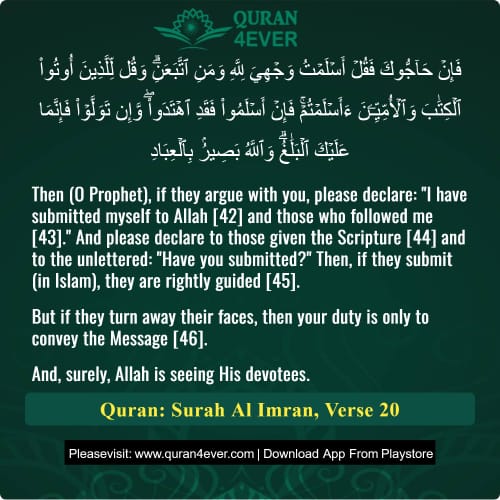
Transliteration:( Fa in haaajjooka faqul aslamtu wajhiya lillaahi wa manit taba'an; wa qul lillazeena ootul Kitaaba wal ummiyyeena 'a-aslamtum; fa in aslamoo faqadih tadaw wa in tawallaw fa innamaa 'alaikal balaagh; wallaahu baseerum bil 'ibaad )
"Then (O Prophet), if they argue with you, please declare: 'I have submitted myself to Allah [42] and those who followed me [43].' And please declare to those given the Scripture [44] and to the unlettered: 'Have you submitted?' Then, if they submit (in Islam), they are rightly guided [45]. But if they turn away their faces, then your duty is only to convey the Message [46]. And, surely, Allah is seeing His devotees."
The verse commands the Prophet ﷺ that if anyone tries to argue, especially those from among the People of the Book or the idolaters, he should not engage in lengthy debate or quarrel.
Instead, he is to firmly declare his own submission to Allah, i.e., openly profess Islam without hesitation.
After declaring the truth, the Prophet should disengage—guidance is in Allah’s hands.
This emphasizes that Da’wah (invitation to Islam) must be clear, confident, and respectful, not argumentative or defensive.
This verse clearly acknowledges the unshakeable faith of the Companions (Sahaba).
Allah Himself asks the Prophet ﷺ to declare not just his own submission, but also the submission of those who followed him.
This highlights the absolute belief and sincerity of the Sahaba.
It also acts as a testimony from Allah in their favor.
Therefore, anyone who doubts the Imaan (faith) of the Sahaba is, in effect, rejecting this Divine affirmation, and such denial is a serious deviation.
The command is to proclaim this message of submission to both:
Those given the Scripture: Referring to the Jews and Christians, including their scholars and laypeople.
Those who read not: Refers either to the polytheists or to the illiterate masses among the People of the Book.
Thus, the message is universal, cutting across learned and unlearned, believer and disbeliever, emphasizing that the call to Islam is for all of humanity.
From the question “Have you submitted?” we learn that:
True Islam begins with conscious submission to the will of Allah and belief in His final Messenger ﷺ.
Therefore, no Christian or Jew is considered Muslim unless they also believe in the Prophethood of Muhammad ﷺ.
Islam is not inherited or cultural—it is a deliberate, conscious choice of submission.
Thus, those who accept this message are rightly guided, while those who refuse have gone astray.
The final part of the verse establishes a key principle of Islamic Da’wah:
The Prophet’s responsibility is only to deliver the message.
If people reject it, he is not to be held accountable for their disbelief.
This reflects the absolute independence and glory of Prophethood:
The Prophet’s truth and rank do not depend on public acceptance.
Just as the sun’s light remains unaffected if someone denies its existence, the Prophethood of Muhammad ﷺ remains supreme, even if the entire world rejects it.
Lastly, the verse ends with the powerful reminder that Allah sees His servants, meaning He is fully aware of who accepts and who turns away, and no response goes unnoticed.
The tafsir of Surah Imran verse 20 by Ibn Kathir is unavailable here.
Please refer to Surah Imran ayat 18 which provides the complete commentary from verse 18 through 20.
(3:20) And if they remonstrate with you, tell them: ‘I have submitted my whole being to Allah, and so have those who follow me.’ And ask the People of the Book as well as those who follow no heavenly Scripture: ‘Have you also submitted (to Allah)?’[18] If they have submitted to Him, they are indeed on the right way but if they deviate from submitting to Allah, then your duty is merely to deliver the message. Allah observes the affairs of His servants.
18. The Prophet (peace be on him) is asked to tell them in effect: I and my followers have embraced the original, unadulterated Islam which is the true religion enjoined by God. Tell us, now, if you are prepared to give up the accretions introduced by your forefathers, and embrace this original, true religion?’
[119]- Those who had no scripture (i.e., the pagans).

For a faster and smoother experience,
install our mobile app now.
Related Ayat(Verses)/Topics